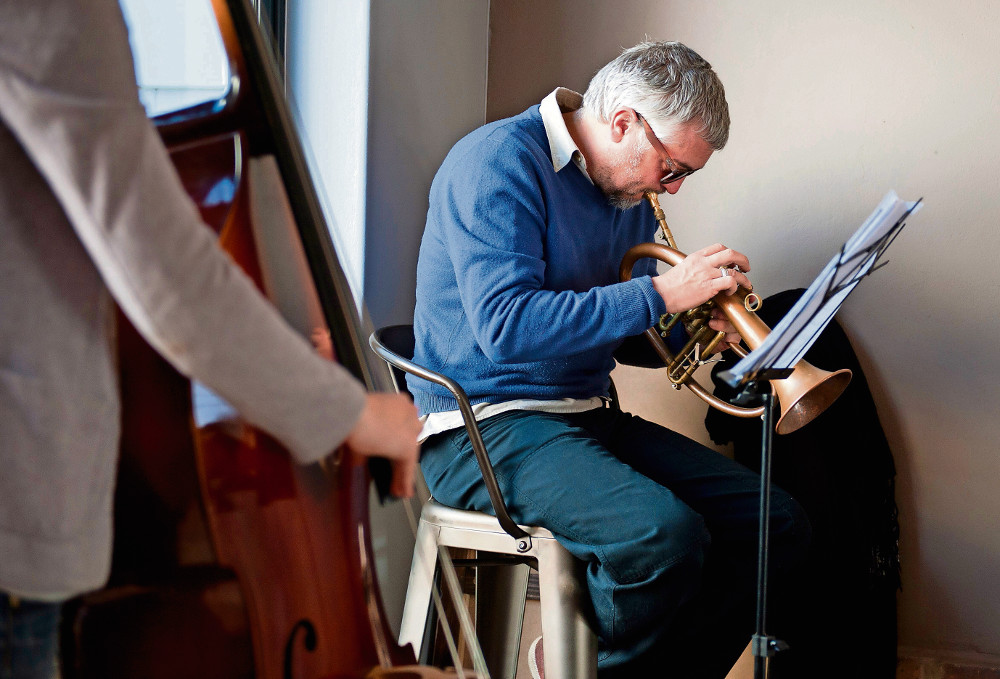Greenside gig: Marcus Wyatt with drummer Jonno Sweetman and upright-bass player Romy Brauteseth.
The latest recording by trumpeter Marcus Wyatt and the ZAR Jazz Orchestra, One Night in the Sun, revisits 11 songs from his catalogue as performed by a 17-piece unit. Looking at the proposition on paper, it would be easy to imagine a big band coming out swinging, but this 97-minute offering is one of subtlety rather than a show of force.
“If I listen to a big band I prefer that they don’t play a whole gig of traditional, straight-ahead big-band writing,” says Wyatt. “There are amazing soloists in this band and they are given the same space as whether they were playing in a small band.”
Wyatt says the project happened by chance, after he was asked if it had occurred to him to record his material with a big band. “Once it became a possibility in my head, the rest of it kind of fell into place,” he says.
When it came to the selection process, Wyatt says he went for songs in his head “that could lend themselves to that [big-band] format but still have that small-band feel”. The thoughtful arrangements and the widened palette create a sense of elegance, and the sensation of listening to the songs is one of encountering them in their seasonal fullness. The primal and ethereal connect throughout.
On many songs, the contribution of vocalist and trombonist Siya Makuzeni is spellbinding, both in how pre-existing lyrics are rendered anew and in vocal experimentation. Take the song In the Beginning/ Australopithecus Africanus, which thematically pans from the Big Bang to the emergence of Homo sapiens.
On it, Makuzeni goes from adding harmonic layers to charting the course of human evolution as she shapes her voice from breathy tones into ecstatic, diviner-like growls. To understand the added powers of Mr Baloi (a dedication to Gito Baloi penned by Makuzeni) as performed with the ZAR Jazz Orchestra, it is worth revisiting Wyatt’s first Language 12 album.
The horn arrangements that accompany this live version to its end, not to mention the urgency and emotional quality of Makuzeni’s voice both as instrument and pained griever, speak to the passage of time perhaps deepening the wounds of loss as opposed to healing them.
But, at the same time, part of why One Night in the Sun is so impressive is how all the standout inputs (and there are many) reveal themselves over time. The lightness of pianist Bokani Dyer’s touch in Zonki’s Dance, for example, gives this rollicking song a levitational edge. As he is wont to do, Wyatt himself blends seamlessly into the proceedings of One Night in the Sun, as opposed to leading from the head.
Another notable bent here is the prevalence of dedications, something Wyatt admits to having a soft spot for. Perhaps the fact that Wyatt draws from his 2002 release Africans in Space for at least half the tracks listed here is what gives this album its air of accessibility. Africans in Space was written during a stint in Amsterdam that saw Wyatt, as he has said, “subconsciously gravitating to a sound most people would associate with South African jazz because I was homesick”.
The tailor-made concision of Africans in Space, however, is abandoned on the new album for epic, gradual shifts in theme and tempo. “I don’t presume to know what it takes to become commercially successful with the stuff,” says Wyatt. “The fact that the music is accessible but at the same time challenging for us as musicians to play… I’m very proud of that, because I don’t want to make music that people scratch their heads [at] and go: ‘Uhh, I don’t get that.’ The nice thing about jazz music or music made in that approach is that it’s really about the personalities and about the energy of the people.”
This extends beyond the musicians making the music to the audience present to receive it. This was in stark evidence last Sunday, when Wyatt played two shows in Jo’burg, the first at a restaurant-pub in Greenside and the second at the Afrikan Freedom Station in Westdene.
The first, an afternoon slot with upright-bass player Romy Brauteseth, who features on One Night in the Sun, and drummer Jonno Sweetman, was a comparitively neutered affair — technically proficient but somewhat straitjacketed, probably a result of the nonchalance of a fair portion of the crowd.
The second performance, led by saxophonist Rus Nerwich and with the addition of Nick Williams on piano, was a much more emotive affair. It was spurred to greater heights by the investment of the crowd in the proceedings and the camaraderie among the players, particularly Nerwich and Wyatt.

For the most part, One Night in the Sun stays true to the spirit of its recording, with an encore and just one track left out from the January concert that was recorded at the SABC M1 studios. Perhaps the deeper resonance of the album comes out of the way in which it encapsulates Wyatt’s journey into himself and his musings on what it means to be an English-speaking white man and a South African musician.
“I see that [for] a lot of people who are steeped in tradition and culture, be it musically or otherwise, it is not so easy for them to step outside of [it],” he says. “Things that they are involved in musically are very much dictated to by that heritage. On the one hand, that’s an amazing, beautiful thing; on the other hand, for me it’s interesting, because of the way I grew up, to be able to step in and out of those musical contexts.” On avoiding sounding forced, Wyatt says: “I’ve been doing this music thing for 25 years, even longer. Gradually now it’s starting to feel like it’s starting to come out naturally.”
The Marcus Wyatt Sextet will perform at The Orbit, in Jo’burg, on Saturday July 25